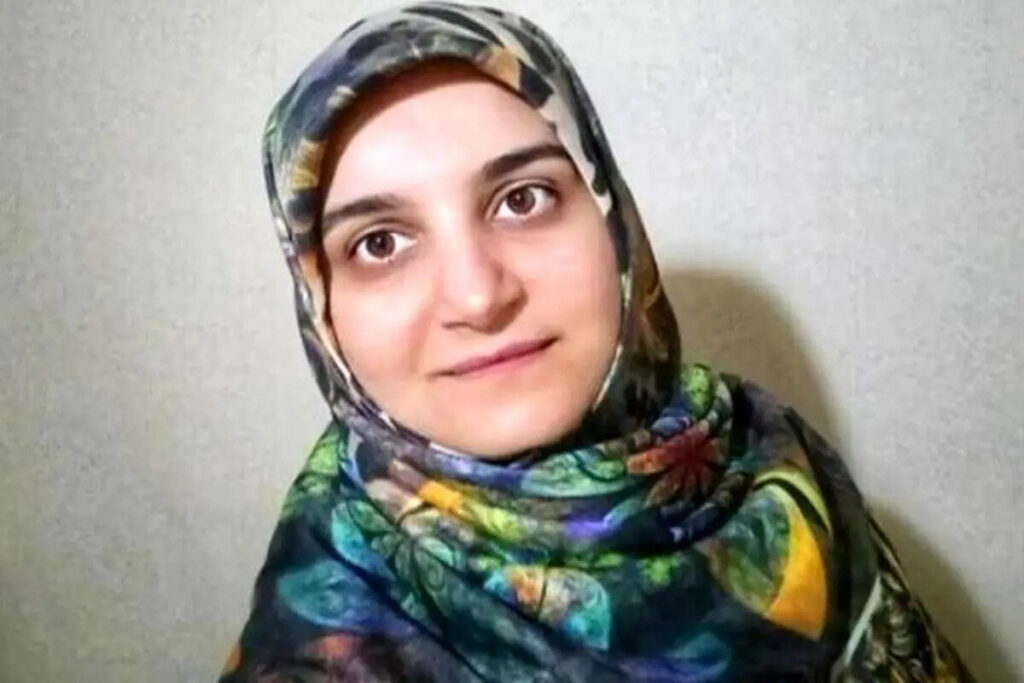Tehran – Mahdieh Esfandiari, a 39-year-old Iranian translator and academic at Lumiere University in Lyon, has been detained in France since February 28th over social media posts in support of Palestine.
Her sister, Mohadeshee Esfandiari, in an interview with Iranian provincial television on Tuesday, called the arrest “hospitalization,” revealing that Madiy remains in solitary confinement under worsening physical and psychological conditions.
“Fifteen five days later, they finally granted consular access,” she said, denying her sister the right to wear her hijab, highlighting the face of serious nutrition and mental distress.
Vahid Jalalzadeh, the deputy minister of Iranian consul, parliament and Iranian expatriates, repeatedly angered his family and argued that Esfandiari’s detention constituted “the take-up of hostages by the state that asserts the free expression of the champion.”
He confirmed that French authorities had not presented reliable legal evidence to justify the justification for accusing her of “apologizing terrorism.”
“Her only crime was to publish content in solidarity with the oppressed people of Gaza,” stressed Jalalzadeh, noting that Iran has launched 42 diplomatic and legal measures since March 4, summoning official memos, French envoys and securing legal representation.
Despite three consul meetings with detained scholars (the latest meeting with the ambassador to Paris on May 28th), family visits remain banned.
Jalalzadeh also confirmed that French prison officials are forcing Esfandiari to remove her hijab, a violation of her basic religious rights.
Esfandiari’s arrest follows a violent police attack on Lyon’s home, where a masked police officer smashes her door and takes her away without explanation.
For weeks, her family and Iranian diplomats received no information about her whereabouts until the French magazine Le Point revealed she was being held at the Fresness prison near Paris.
Prosecutors concluded her case in a 2023 report by France’s National Center for Online Hate Crimes (PNLH) and accused her of publishing social media posts in October 2023 about the Palestinian fighter, Operation Al Axa Storm, which “incites terrorism.”
In particular, PNLH has faced scrutiny for systematically suppressing the voice of propalestine, including banning activist group Collectif Palestine Vaincra and indicting trade union member Anasse Kazib for similar social media activities.
At a press conference on Tuesday, Iranian judicial spokesman Asghar Jahangir condemned the detention as “an illegal, blatant expression and violation of freedom of personal security,” citing the declaration of universal human rights and international contracts on civil and political rights ratified by France.
“Prosecutors argued for terrorism, but her posts defended only the oppressed population of Gaza. In France, supporting a oppressed state has been criminalised,” he said.
Jahangir confirmed that Iran’s High Council is pursuing an unconditional release of Esfandiari through diplomatic channels.
Silencing the voices of the pro-Palestin while refueling genocide
The Esfandiari case reflects an escalating crackdown on Iranian activists and journalists in Paris.
One case includes Iranian and French journalist Shahin Hazamie, who was arrested on April 22 when ten masked officers attacked a Paris home, causing serious pain to their wives and young children.
Hazamie, who was charged with “Apology Duterorism,” previously criticised Esfandiari’s detention and shared a viral video of her Palestinian mother at a rally in Paris that earned 50 million views a few days before her arrest.
In another example, Bashir Biazar, which was linked to the Iranian broadcaster’s Islamic Republic, was deported in June 2024 after spending 28 days of administrative detention for an Instagram post denounced the Israeli regime’s war of massacres over Gaza.
Paris denounced him for “anti-flash remarks,” a measure that Iranian judiciary denounced as a human rights violation.
Biazar, now released, argues that these arrests reflect French “medieval tactics” consistent with Israeli interests.
“France defended Charlie Hebd’s anti-Islamic cartoons as free speech, but is prosecuting Muslims in support of Palestine,” he said in a recent interview with an Iranian television channel, adding, “this hypocrisy will reveal a campaign to criminalize anti-Gionism under the guise of terrorism.”
The continued oppression of French pro-Palestinian voices is in contrast to Macron’s claims to put pressure on the Israeli regime against Gaza’s humanitarian crisis.
French authorities have recently issued a tepid threat of sanctions against Israeli officials, but critics have argued that these measures are too little and too late.
For decades, Paris has maintained an unsettling military ties with Tel Aviv. Despite its public attitude, French companies have provided an important element to Israel’s arms industry.
Recent revelation shows the shipment including a 14 ton consignment of machine gun spare parts from the port of Fos-Sur-Mer.
French dock workers have denounced their role in blocking these shipments and promoting an ongoing campaign against Palestinian civilians.
This dual strategy exemplifies the dangerous accomplices of France, silences the voices of pro-Palestinians while strengthening Israeli war machinery.

